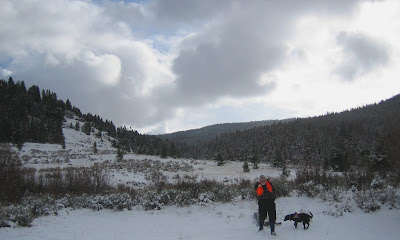With hunting there is a direct & unmediated connection between the meat on our table and the health of our environment. Since a low point around 1900, when Rocky Mountain elk were market-hunted nearly to extinction, their population has returned to historic levels experienced by Montana's First Peoples (and by early White visitors such as Lewis & Clark). Wolves -- an instrumental predator in shaping the evolution of elk and other large ruminants -- have also largely recovered.
We buy no red meat, and so are thankful for a tender cow elk. Field dressed, each half weighs about 150 pounds (head & legs removed; tenderloins, backstraps, liver, and heart packed separately). Even with snow and a mostly downhill route, it's a lot to move from the kill site to the nearest road almost 2 miles away. So I am also thankful for the help of friend (and former hunting buddy) Dave Carter. Here's Dave, on the first mile of the drag, still up in the timber:
I left the split elk in the hills a few days. Dragging the two halves a few hundred feet from the butchering site and marking the area with my urine kept the coyotes and wolves at bay. Covering the carcass halves with fir branches kept the birds from the meat, although the morning Dave & I returned there was a flock of about 40 Wolf-birds ready to begin feasting (the first raven to find a large carcass purposely calls others to the site--this spirit of cooperation works as a social welfare/survival system).
The dogs join us for elk dragging adventures. Here's JackTheDog working on the gutpile--he's part wolf and you can see that part in this photo:
For MollyTheDog, barely a year old, it's all about play. She runs back & forth between Dave & I checking on our progress and insuring that the elk does not escape. Here she is with Dave, on the last mile of the drag in a broad meadow bordering the road:
"Little Brother" A.J. spent this weekend at hunting camp with a friend & his family, where "hunting" is more about socializing than it is about the pursuit of food and developing an intimate connection with nature. That is OK and it's good for a young person to experience various aspects of hunting culture. In a world dominated by entertainment media, commodities (i.e. "shopping"), and motorized travel, it is getting increasingly rare to see another hunter even a half-mile from the nearest road. I have spent my life as a hunter on a spiritual quest, and am thankful to share that aspect with daughter Emily, A.J., and you as a reader of this blog.
Thank you, and may we all have much to be thankful for as the day shortens, the temperature falls, and the snow deepens.
Tracking, AI, Human Gaits
1 week ago




6 comments:
Thoughtful post... I don't know anything about hunting or hunters really, but have a strong impression that here in NJ it's a mostly *social* venture, as you mention.
As I said in my last comment... what a huge amount of work! So many of us take our food for granted; I don't imagine that's possible for one who works so hard for it.
I didn't know the birds would call each other to a carcass. Interesting.
Good to hear that the elk (and wolves) are thriving.
I'm glad at least a few young people are learning to enjoy the outdoors. We see so few young people (or older folks) out enjoying the mountains in our area.
Nice account and good photos of "the fun part"! I find hauling meat very satisfying, even when it gets to be a grind. The same thing for butchering out and packaging game. Even when your back is tired and looking at pieces of elk has gotten old, there's a lot of satisfaction in taking the final steps of the process and putting up a year's meat.
Great story and even better hunt. Thanks for sharing what I've yet to accomplish for myself this year. One more chance for elk in a couple weeks.
I was telling a work colleague about you not buying red meat, eating only what you have killed, and I said that I respect you for that decision. You are personally involved with your meat, and you respect it, and the animals it comes from. Those of us who simply drive to the grocery store take our meat so much for granted. Not that I want to try your way, at all!
Around Missoula we call people who eat only the meat they hunt "Wildetarians."
Post a Comment